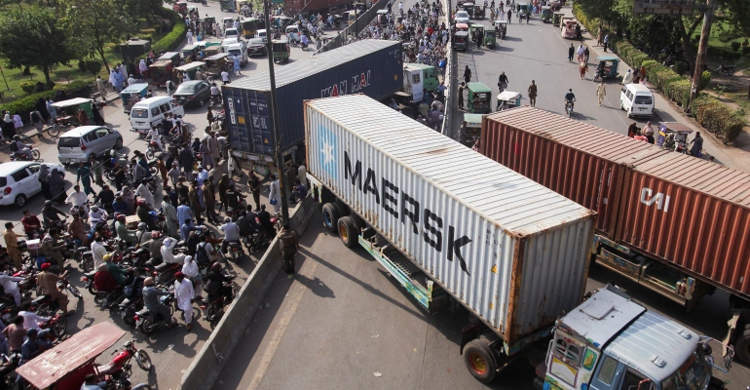Pakistan bans Imran Khan’s march after cop killed

Pakistan’s government has banned a planned protest march called by former Prime Minister Imran Khan, who is demanding fresh elections as political and economic crises deepen in the South Asian nation.
The ban was announced on Tuesday by Interior Minister Rana Sanaullah at a news briefing hours after a policeman was shot and killed during a crackdown on Khan’s supporters across the country.
“No one would be allowed to siege the capital and dictate his demands,” Sanaullah said, adding that cabinet had approved the ban.
An official of Khan’s Pakistan Tehreek-e-Insaf (PTI) party shot and killed the policeman when police visited his house, Information Minister Marriyum Aurangzeb told the news briefing, adding that the accused and his father had been arrested.
Khan, who did not publicly condemn the policeman’s killing, defended the shooting by his party official, a retired army officer, asking what should someone do if police barged into their home.
According to Fawad Chaudhry, a PTI spokesman, police raids against their supporters started shortly after midnight on Monday. Homes were raided on Tuesday morning and at least 400 supporters of the party were arrested across the country, Chaudhry said.
Authorities confirmed the raids but refused to share details about any arrests.
Several other prominent figures from Khan’s party warned police they could face violent resistance if raids on their homes continued.
‘Get ready for sacrifices’
Khan, a former cricket star-turned-politician, served as prime minister for more than three and a half years until he was removed by a no-confidence vote in parliament in April.
Khan has remained defiant since, demanding early elections and claiming his removal was the result of a United States-led conspiracy in collusion with his successor, Pakistan’s new Prime Minister Shehbaz Sharif. Washington denies any role in Pakistan’s internal politics.
At a news conference in the northwestern city of Peshawar on Tuesday, Khan promised to carry on with the rally in the Pakistani capital as planned on Wednesday.
“I tell my supporters to reach Islamabad and I will also be there,” he said, insisting he was not afraid of death and urging his followers to “get ready for sacrifices” for the sake of Pakistan’s sovereignty.
“You try to stop us if you could,” he told reporters, saying a peaceful protest was his right that could not be denied.
‘Evil designs’
Sanaullah warned Khan that he would “not be allowed to disrupt peace in Islamabad” and would be arrested if needed, should the rally go ahead. Sanaullah earlier in the day accused Khan of seeking to create a civil war-like situation.
He said Khan and his aides had termed it a bloody march, which could not be allowed following a sit-in that Khan held in 2014 for more than four months that paralysed the country.
At the time, Khan had rallied thousands to protest against the alleged rigging of an election in 2013, and his supporters had attacked police and threatened to storm the parliament and prime minister’s house.
“They’re coming to Islamabad with evil designs,” the interior minister said, citing intelligence reports about the march.
Authorities in Islamabad had started putting up blockades at roads leading to important installations, police said, and heavy contingents from police and paramilitary troops have also been deployed.
Large shipping containers were placed on a key road leading to the parliament building in Islamabad, to prevent Khan’s supporters from getting close and possibly staging a sit-in there.
Many entry and exit points around the city of Lahore, 380km (236 miles) from the capital, were also blocked.
Khan lost power in part due to his failure to rectify Pakistan’s dire economic situation, including its mounting debt, shrinking foreign currency reserves and soaring inflation.
With foreign reserves falling to $10.3bn – lower than two months of import bills – a fast-crashing Pakistani rupee and double-digit inflation, the political turmoil has compounded economic volatility in the country.
Sharif, who replaced Khan last month, has yet to take bold steps towards putting the economy back on track.
Talks are continuing in Doha between the government and the International Monetary Fund (IMF) to resume a $6bn rescue package agreed in 2019, and are due to conclude on Wednesday.
Source: Al Jazeera

